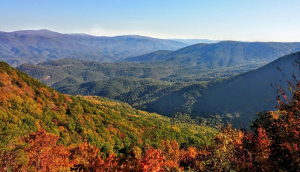2023 Southeastern Bat Diversity Network Bat Blitz
August 6-10, 2023

Chattahoochee National Forest and Ft. Mountain State Park
Chatsworth, Georgia
Blitz Summary
Hosts: Katrina Morris, Emily Ferrall, and Maggie Hunt (Georgia Department of Natural Resources) and Ruth Stokes and Rollins Jolly (U.S. Forest Service).
More than 80 bat biologists, researchers, managers and students converged at Fort Mountain State Park August 6 – August 10, 2023 for the Southeastern Bat Diversity Network’s (SBDN) 20th Annual Bat Blitz. Seventy-four volunteers representing 45 agencies, corporations, universities and organizations traveled from 14 states including Illinois, Texas, Indiana, Colorado, Virginia, Michigan, and Arkansas. Participants volunteered their time and shared survey equipment to conduct a landscape-scale survey for bats in the Chattahoochee National Forest and adjacent state and federal lands.
Thirty-three sites were sampled over a 3-night period. Net sites were located inside Fort Mountain State Park, surrounding lands within the Chattahoochee National Forest and Carters Lake area (U.S. Army Corps of Engineers), state lands and other sites in Gilmer, Fannin, and Murray counties, Georgia. Surveys were conducted in oak-hickory-pine and southern mixed hardwood forest types along mountain streams, trails, road corridors and flyways near a gated mine. Bats were captured using a variety of mist nets configurations. Data collected from each bat included species, sex, age, weight, forearm length, reproductive condition and an examination of wing membrane surfaces for signs of white nose-syndrome. United States Fish and Wildlife Service and Georgia Department of Natural Resources protocols for disinfection between bats and between netting sites were followed, as were current U.S. Fish and Wildlife Service SARS CoV-2 protocols for safe handling of bats.
During three nights of sampling, often between rain and lightning events, participants captured 98 bats representing 6 species. Species captured included 1 northern long-eared bat (Myotis septentrionalis, federally endangered species), 1 tricolored bat (Perimyotis subflavus, federally proposed endangered species), 1 eastern small-footed myotis (M. leibii, species of concern), 53 big brown bats (Eptesicus fuscus), 39 red bats (Lasiurus borealis), and 3 evening bats (Nycticeius humeralis).
The 2023 blitz was a resampling event to survey the same sites previously sampled in Georgia for the 2010 SBDN blitz. The 2010 blitz occurred before white-nose syndrome appeared in Georgia in 2013, and stark differences in bat abundance and diversity were observed between the events. Notably, the 2010 blitz captured 89 northern long-eared bats and 65 tricolored bats, so capturing only 1 of each of these species at the 2023 blitz was a significant difference in species abundance. The 2010 blitz captured 292 bats of 9 species, reflecting another shift in bat diversity in the area compared to the 98 bats of 6 species captured at the 2023 blitz.
Occurrence data will be used to make informed management decisions and provide baseline data for the area sampled.
